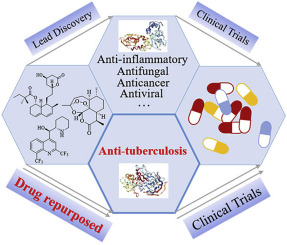当前位置:
X-MOL 学术
›
Eur. J. Med. Chem.
›
论文详情
Our official English website, www.x-mol.net, welcomes your
feedback! (Note: you will need to create a separate account there.)
Repurposed drug candidates for antituberculosis therapy.
European Journal of Medicinal Chemistry ( IF 6.0 ) Pub Date : 2020-02-25 , DOI: 10.1016/j.ejmech.2020.112175 Qi An 1 , Chungen Li 1 , Yao Chen 2 , Yong Deng 2 , Tao Yang 3 , Youfu Luo 1
European Journal of Medicinal Chemistry ( IF 6.0 ) Pub Date : 2020-02-25 , DOI: 10.1016/j.ejmech.2020.112175 Qi An 1 , Chungen Li 1 , Yao Chen 2 , Yong Deng 2 , Tao Yang 3 , Youfu Luo 1
Affiliation

|
Antibiotics have been a key part of clinical treatments for more than 70 years. Long-term use of antimicrobial treatments has led to the development of severe bacterial resistance, which has become increasingly serious due to antibiotic abuse, resulting in the treatment of bacterial infections becoming challenging. The repurposing of approved drugs presents a promising strategy to address current bottlenecks in the development of novel antibacterial agents. Drug repurposing is a cost-effective emerging strategy, which aims to treat resistant infectious diseases by identifying known drugs with predicted efficacy for diseases other than the target disease. This strategy has potential in the treatment of tuberculosis (TB), particularly drug-resistant TB. In recent years, a panel of drugs approved for clinical use or clinical trials, such as linezolid, vancomycin and celecoxib, have been found to have anti-TB activities. However, the utility of drug repurposing is limited by the number of candidate compounds and their low activities. The low activities of repurposed drugs have slowed the development of a drug-repurposing strategy for anti-TB drugs. The present review discusses progress in the discovery of new anti-TB agents through drug repurposing since 2014. We also discuss the challenges faced and analyze the innovative ways that are being used to overcome these difficulties. This review may provide a useful guide for researchers in the field of drug repurposing.
中文翻译:

重新定位的抗结核药物候选药物。
70多年来,抗生素一直是临床治疗的关键部分。长期使用抗菌治疗已导致严重的细菌耐药性发展,由于抗生素滥用,这种耐药性变得越来越严重,导致细菌感染的治疗变得充满挑战。批准药物的重新利用为解决当前新型抗菌剂开发中的瓶颈提供了一种有前途的策略。重新利用药物是一种具有成本效益的新兴策略,旨在通过鉴定对目标疾病以外的疾病具有预测疗效的已知药物来治疗耐药性传染病。该策略在治疗结核病(TB),特别是耐药结核病方面具有潜力。近年来,一组批准用于临床或临床试验的药物,例如利奈唑胺,已发现万古霉素和塞来昔布具有抗结核活性。然而,药物再利用的效用受到候选化合物数量及其低活性的限制。改用药物的低活性减慢了抗结核药物用药战略的发展。本综述讨论了自2014年以来通过药物用途发现新抗结核病药物的进展。我们还讨论了所面临的挑战并分析了用于克服这些困难的创新方式。这篇综述可以为药物再利用领域的研究人员提供有用的指导。改用药物的低活性减慢了抗结核药物用药战略的发展。本综述讨论了自2014年以来通过药物用途发现新抗结核病药物的进展。我们还讨论了所面临的挑战并分析了用于克服这些困难的创新方式。这篇综述可以为药物再利用领域的研究人员提供有用的指导。改用药物的低活性减慢了抗结核药物用药战略的发展。本综述讨论了自2014年以来通过药物用途发现新抗结核病药物的进展。我们还讨论了所面临的挑战并分析了用于克服这些困难的创新方式。这篇综述可以为药物再利用领域的研究人员提供有用的指导。
更新日期:2020-02-26
中文翻译:

重新定位的抗结核药物候选药物。
70多年来,抗生素一直是临床治疗的关键部分。长期使用抗菌治疗已导致严重的细菌耐药性发展,由于抗生素滥用,这种耐药性变得越来越严重,导致细菌感染的治疗变得充满挑战。批准药物的重新利用为解决当前新型抗菌剂开发中的瓶颈提供了一种有前途的策略。重新利用药物是一种具有成本效益的新兴策略,旨在通过鉴定对目标疾病以外的疾病具有预测疗效的已知药物来治疗耐药性传染病。该策略在治疗结核病(TB),特别是耐药结核病方面具有潜力。近年来,一组批准用于临床或临床试验的药物,例如利奈唑胺,已发现万古霉素和塞来昔布具有抗结核活性。然而,药物再利用的效用受到候选化合物数量及其低活性的限制。改用药物的低活性减慢了抗结核药物用药战略的发展。本综述讨论了自2014年以来通过药物用途发现新抗结核病药物的进展。我们还讨论了所面临的挑战并分析了用于克服这些困难的创新方式。这篇综述可以为药物再利用领域的研究人员提供有用的指导。改用药物的低活性减慢了抗结核药物用药战略的发展。本综述讨论了自2014年以来通过药物用途发现新抗结核病药物的进展。我们还讨论了所面临的挑战并分析了用于克服这些困难的创新方式。这篇综述可以为药物再利用领域的研究人员提供有用的指导。改用药物的低活性减慢了抗结核药物用药战略的发展。本综述讨论了自2014年以来通过药物用途发现新抗结核病药物的进展。我们还讨论了所面临的挑战并分析了用于克服这些困难的创新方式。这篇综述可以为药物再利用领域的研究人员提供有用的指导。











































 京公网安备 11010802027423号
京公网安备 11010802027423号